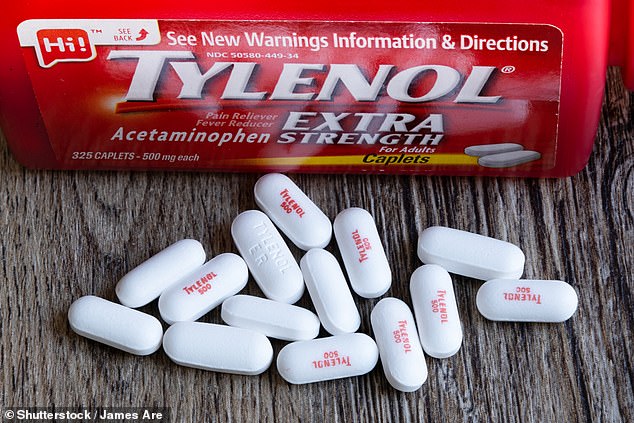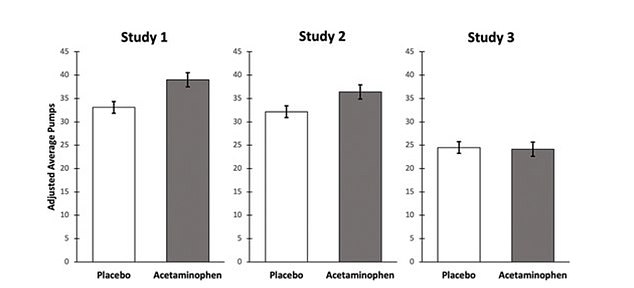The world’s most popular pain reliever may cause people to take more risks and reduce fear around risky decisions, leading to bolder behavior.
Nearly a quarter of Americans take acetaminophen – the active ingredient in Tylenol – weekly and data estimates 100million Americans take it annually.
Recently, scientists have been investigating how it might influence people’s behavior on a larger scale.
To measure the effects of acetaminophen, researchers from Ohio State University had over 500 college students participate in a risk-taking game.
Some participants received a normal dose of acetaminophen, 1,000 mg, mirroring standard over-the-counter use, while others received a placebo.
In the game, they inflated a virtual balloon to earn cash rewards. If it burst, they lost everything. The acetaminophen group pumped more aggressively and popped more balloons, suggesting they cared less about the risk of losing.
In follow-up surveys, those on acetaminophen rated activities like bungee jumping or gambling as less risky than the placebo group, but only when the scenarios were emotionally charged.
Researchers warned that while the changes in risk-taking are subtle, they’re worth watching, mainly because acetaminophen is found in over 600 medications.

Acetaminophen is the active pain reliever in Tylenol
The study suggested that acetaminophen’s effect on risk-taking behavior likely goes beyond just dulling fear.
The over-the-counter drug may also alter deeper cognitive and neurological processes, including by turning off the brain’s alarm signals for danger.
It may also reduce awareness of one’s mistakes, and quiet a part of the brain that gives someone a gut feeling that danger is close.
Dr Baldwin Way, co-author of the 2020 study and associate professor of psychology at Ohio State University, said: ‘Acetaminophen seems to make people feel less negative emotion when they consider risky activities – they just don’t feel as scared.’
Dr Way conducted three experiments in his report, published in the journal Social Cognitive and Affective Neuroscience.
Across these studies, 545 undergraduate students took part in a task developed in 2002 that is often used by researchers to measure risk-taking behavior: inflating a balloon in exchange for cash rewards.
They can stop at any time, bank the money, and move on to the next balloon.
The people who took acetaminophen pumped more and more, despite the risk of the balloon popping and losing all their money.
In the balloon-popping game, people who took acetaminophen pumped 32 times compared to 29 times in the placebo group, and had more bursts, with 8.5 in the acetaminophen group compared to 7.9 in the placebo group.

Nearly a quarter of Americans take acetaminophen – the active ingredient in Tylenol – weekly and data estimates 100million Americans take it annually (stock photo)

The above compares results of people who took acetaminophen versus those who were given the placebo in risk-taking games
Dr Way said: ‘If you’re risk-averse, you may pump a few times and then decide to cash out because you don’t want the balloon to burst and lose your money.
‘But for those who are on acetaminophen, as the balloon gets bigger, we believe they have less anxiety and less negative emotion about how big the balloon is getting and the possibility of it bursting.’
Previous research by Dr Way on the effects of acetaminophen on people’s behavior has suggested that it dulls positive and negative emotions, including hurt feelings, distress over another person’s suffering, and their joy.
He posited in his latest research that the medicine reduces anticipatory anxiety. Typically, as the balloon expands, people feel growing anxiety about it bursting, making them stop pumping earlier.
The drug may blunt this nervous feeling, though, causing people to take more risks.
And according to Dr Way, ‘increased risk-taking could have important effects on society.’
With a dampened feeling of fear, anxiety and negative emotions, people may be more likely to partake in risky behavior, including cheating on partners, drinking excessively and taking drugs.












